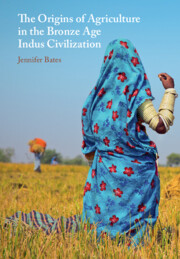Book contents
- The Origins of Agriculture in the Bronze Age Indus Civilization
- The Origins of Agriculture in the Bronze Age Indus Civilization
- Copyright page
- Dedication
- Contents
- Figures
- Tables
- Acknowledgements
- One Introduction
- Two The Paleoenvironmental Context
- Three Laying the Groundwork
- Four Southwest Asian Crops and Their Significance
- Five Big Millets
- Six Small Millets
- Seven Rice
- Eight Tropical Pulses and the Identification of Local Domestication Processes
- Nine Microfossils and the Multi-proxy Approach
- Ten Beyond ‘Staples’
- Eleven Crop Processing and Social Organization
- Twelve Cropping Strategies and Seasonality
- Thirteen Irrigation and Intensification
- Fourteen Indus Identities and Food
- Fifteen The ‘Late Harappan Revolution’
- Sixteen The Burnt Remains
- References
- Index
Sixteen - The Burnt Remains
Published online by Cambridge University Press: 13 December 2024
- The Origins of Agriculture in the Bronze Age Indus Civilization
- The Origins of Agriculture in the Bronze Age Indus Civilization
- Copyright page
- Dedication
- Contents
- Figures
- Tables
- Acknowledgements
- One Introduction
- Two The Paleoenvironmental Context
- Three Laying the Groundwork
- Four Southwest Asian Crops and Their Significance
- Five Big Millets
- Six Small Millets
- Seven Rice
- Eight Tropical Pulses and the Identification of Local Domestication Processes
- Nine Microfossils and the Multi-proxy Approach
- Ten Beyond ‘Staples’
- Eleven Crop Processing and Social Organization
- Twelve Cropping Strategies and Seasonality
- Thirteen Irrigation and Intensification
- Fourteen Indus Identities and Food
- Fifteen The ‘Late Harappan Revolution’
- Sixteen The Burnt Remains
- References
- Index
Summary
In the final chapter, the straw man of the introduction is laid to rest – the Indus can no longer be seen as dull and homogenous and based on a few crops, but must instead be seen as vibrant and complex. The final chapter again acknowledges, though, that we have known this for a long time and we should stop rehashing the straw man and instead look to the future, outlining some new avenues for research instead.
- Type
- Chapter
- Information
- The Origins of Agriculture in the Bronze Age Indus Civilization , pp. 274 - 280Publisher: Cambridge University PressPrint publication year: 2025

